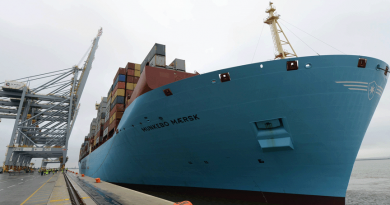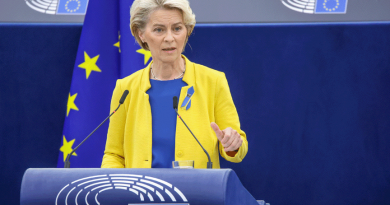Economic deterrence. A code of coercion
Filip Medunic is Programme Coordinator, European Power programme, at the European Council on Foreign Relations (ECFR)
The idea of forming an alliance for sanctions akin to NATO has been floating around for a while. But it has never had as good an opportunity to gain traction as it does now. G7 countries are experiencing an unprecedented moment of unity and, with surprising swiftness, have imposed the strongest ever economic sanctions regime on Russia.
European leaders and commentators are right to acknowledge the importance of coordinated economic measures. But NATO and its collective defence commitment is not quite the right analogy for future geo-economic policies. The EU instead needs a sanctions doctrine – a framework to set out the goals, means, and risks for the use of economic measures.
There is no sign that economic measures for policy objectives (economic coercion or warfare) will be used less in the future and the world has entered a period that will define the next global trade order. The EU should act to shape this order before it is drawn deeper into the vortex of economic warfare.
Impact and effectiveness of economic sanctions are not fully understood and require continuous research. There is good reason to remain cautious on the application of tools of economic coercion for strategic reasons (do they have the intended political impact?) and ethical reasons (do they harm the intended target or others?).
Nonetheless, European policymakers have compelling reasons to codify rules on when and why they resort to economic sanctions. These measures have become much more than a tool for limited coercion or for signalling disapproval of a certain policy.
Sanctions now often define the rules of engagement with the global financial system – and they may have the same effect on trade. But greater restrictions on the global financial and trade order could contribute to long-term instability unless policymakers have a common understanding of the purpose of these measures and the risks they involve.
According to most estimates, sanctions achieve some of their objectives between 30 per cent and 40 per cent of the time (although this depends on various conditions).
The EU needs a sanctions doctrine. This is the only way to prevent open societies and economies that are dependent on free trade from eroding the environment they have benefited from for so long – and from imposing increasing costs on others. It should define the goals, capabilities, and thresholds for applying sanctions, as well as techniques for lifting them.
Goals
The difference in assessing success depends on the question asked: are the economics measures having an effect? Or: are the political objectives reached? For the second question these political objectives need to be defined as well. When sanctions are used as a tool ‘to do something’ then there is barely a coherent answer to this question.
There are nonetheless several political objectives that can be clustered roughly into different categories according to the likelihood of them being realized.
For instance, pressuring an actor into negotiations to resolve a non-violent border dispute is more realistic than ending military aggression to defend abstract national ideas or a regime. In the same way it has been proven several times that regime change is not an objective that can and should be the goal of sanctions.
There are, however, limited objectives that can help defuse military conflict or oppression if they are incorporated into a larger strategy encompassing more tools than only economic sanctions. Most importantly, they need a clear path towards being lifted and the possibility for the private sector to re-engage with a once sanctioned actor.
Therefore, policy makers and the private sector need to continue in a much deeper way the discussion about what the policy objectives can be on the one hand, and what the economic measures are on the other hand.
A sanctions doctrine would improve the European Union’s policymaking process and provide its global partners with clarity about the measures it would implement in certain conditions
Capabilities
A sanctions doctrine should define the different measures the Union has at its disposal, coupled with an assessment of their consequences for the EU and for the target. This would necessarily involve the private sector as well, which in the end implements most economic measures, with the exemption of central bank asset freezes or visa restrictions for example.
Private sector actors might face implementation difficulties due to insufficient personnel or clear enough regulations, but they might also be able to point to secondary consequences further down the line, that on a political level ought to be avoided. It is necessary to involve the private sector in the design of measures to understand their consequences. It might also pre-empt cases of implementation failure and close loopholes.
If sanctions are applied by a large group of actors, they are more efficient, as evasion is more difficult. It is however paramount that those ‘on board’ see a real benefit in these measures and perceive the application of economic coercion as a legitimate tool.
If actors are on the other hand feeling that the measures only work to some interests and might even erode some of their own welfare benefits, coalitions will be hard to find or weak in their resolve.
Political resolve is driving sanctions policy, and often the desire to act outweighs the probability of success, which itself is hard measure. In the public sphere it is a question of communicating the objectives and means to reach them. Communication should be careful in not announcing objectives that are not reachable.
Thresholds
When sanctions are decided they have in most cases an effect on the economy of the implementing state and on the perception of the measures in its society. A threshold approach could help to avoid unpopular or counterproductive measures.
It cannot be defined without the goal and needs an assessment of the probability of success of the economic measure in question. This could include the costs for the implementing economy, the costs for the targeted economy and the political goal that is connected to the measures.
Lifting sanctions
If sanctions cannot be lifted it will be priced into any strategy by international actors. If they are a tool to add pressure to negotiate certain relationships, there needs to be the real prospect for lifting.
If they are set to demand unrealistic goals, they serve as a punishment – which deteriorates their acceptance and can also increase resolve by the targeted actor. It can even lead societies in targeted states to rally in support against such measures, especially if non-elites bear the bulk of the domestic costs for the targeted economy.
Although this issue is sometimes quietly ignored in assessments of coercive economic measures, sanctions can have a severe impact on civilians in the long term without achieving any of the intended policy outcomes.
A sanctions doctrine would improve the European Union’s policymaking process and provide its global partners with clarity about the measures it would implement in certain conditions. Like a military doctrine, it could help prevent escalation.
A doctrine can also help in providing more buy-in from EU member states. The G7 has become a prominent forum for coordinating and announcing Western punitive economic measures, especially with regards to Russia. But G7 countries do not share a single market, and only a few EU member states are full members.
Defining a doctrine at EU level could help a more coherent EU decision making and even pre-empt some of the lengthy discussions on capacity of implementation on member state level. The exercise could also help to continue the discussion between member states and the European private sector, which at the end will be at the forefront of implementation of many measures.
The union is currently debating an anti-coercion instrument, which would be the world’s first such measure for collective economic deterrence. Therefore, the EU is already much further along in the process of institutionalising its approach to economic retaliation than any other state or group of states.
The public debate on the instrument shows that the issue of when to apply it is highly complex – and that, at the moment, this is only at the EU level and purely for deterrence.
As such, before attempting to resolve any international problem by sanctions, the EU will first need to clarify its own sanctions goals and honestly assess the potential and limitations of sanctions in a broader doctrine.
The EU’s internal market, technological strength, and commitment to open trade mean that it has huge geopolitical potential. But the union will need to understand the strengths and weaknesses of economic measures before it can fulfil this potential on a global scale.




